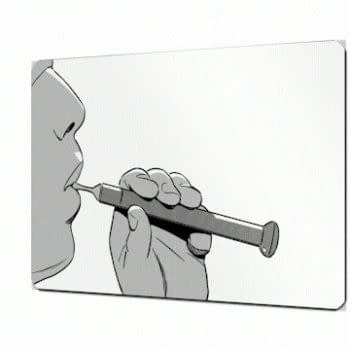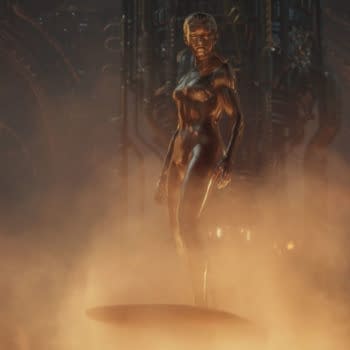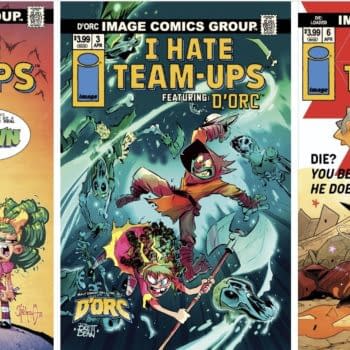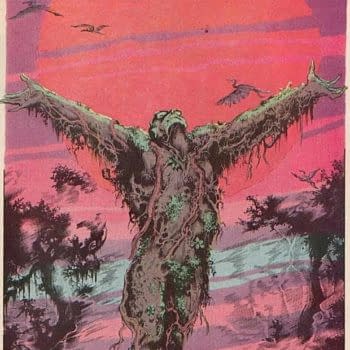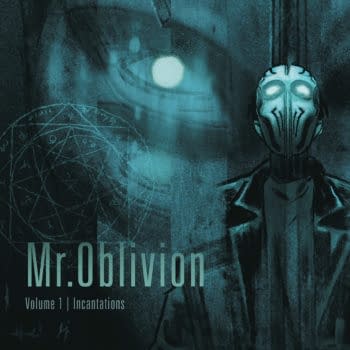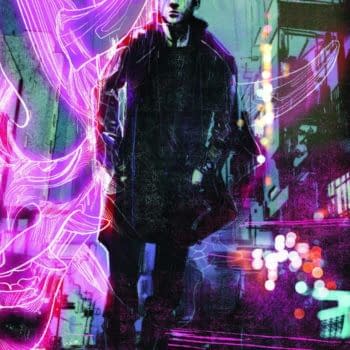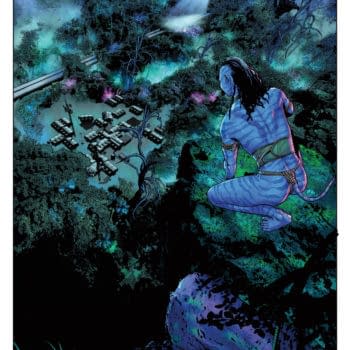Posted in: Comics, san diego comic con | Tagged: ccomics, entertainment, Gene Luen Yang, scott mccloud, Shadow Hero
Gene Luen Yang Talks The Shadow Hero, And God, With Scott McCloud
Peter S. Svensson drinks Gatorade while writing for Bleeding Cool.
Gene Luen Yang is a fantastically talented graphic novelist. His "Boxers and Saints" duo of interlocking graphic novels were among the most critically acclaimed books last year. Here was his spotlight solo panel, with guest star Scott "Understanding Comics" McCloud asking questions and steering the conversation along.
The main focus of the panel was Yang's latest book, Shadow Hero, where he reinvents a Golden Age hero who was probably Chinese-American. For this book, he wanted an artist whose style could genuinely do superheroes, and thus is working with Sonny Liew, whose last project was Malinky Robot for Image. The story goes that the golden age character, the Green Turtle, created by Chinese-American Chu Hing, was originally intended to be Chinese, but alas, the years was 1944 and getting a Chinese hero published in America at that point was a fruitless endeavor. Instead, the Green Turtle was always either wearing a mask, or otherwise never seen in an pose that would expose what he actually looked like, thus allowing Hing to at least pretend that his character was in fact Asian by never confirming that he wasn't.
Gene Luen Yang's graphic novel takes that initial concept, and runs with it. It helps that the character is now public domain. It's currently on sale at the convention floor from publisher First Second.
So, Scott McCloud started the panel off by explaining that he was rather superfluous, as the focus is intended to be on Gene Luen Yang. Yang explained that the only reason he went into comics in the first place was after reading McCloud's seminal work, "Understanding Comics." If someone went back in time and told 19 year old Yang that he'd one day do a panel with Scott McCloud, his head would explode. He continued to explain that there's an entire generation of comic creators inspired by McCloud. Mutual admiration was made. Yang explained that since the only reason he made the commitment to create comics for a living was from McCloud, that now he has someone to blame when he has trouble making the mortgage due to being an artist for a living.
Ivy McCloud, Scott's wife, was running the powerpoint presentation, which was mainly going to be her choosing images that relate to whatever the conversation was about, with several images pre-chosen by Scott. Yang joked that this seemed like a test, and that if pressed he could recite all six panel transitions from Understanding Comics.
McCloud demonstrated the incredible visual ingenuity of Boxers and Saints, Yang's previous graphic novel duology, each volume having half of a face which when placed together look great. He then showed an image of the two volumes being placed together in reverse order, so the two half faces don't match up, and asked if Yang wanted to punch people who did that. Jovial joking about Yang being "Really good at punching people." followed up. McCloud was seriously disappointed when he realized that in his capacity as editor of the Best Comics of the Year anthology, that Boxers and Saints was published two weeks too late to meet the cutoff, as he would have included a selection of it, but now can only hope that this shames whoever will be editor of next year's anthology to include it instead.
This was a pretty light affair, with two people who love comics sitting around and taking it seriously, but still having fun. McCloud talked about how Yang is one of the best creators in the business for surprises and making choices that are genuinely shocking, that aren't just what anyone else would do. The example that McCloud started off with was Cousin Cheeky from Yang's semi-autobiographical masterpiece, American Born Chinese.
Cousin Cheeky is "an amalgamtion of every negative Asian stereotype." When he comes to town, his luggage is shaped like Chinese Take-Out boxes. He's genuinely uncomfortable to look out, given how massively exaggerated a racist caricature he is. Yang explained that when he first began doing American Born Chinese, it was as mini-comics that he distributed to friends and family, about a dozen in total. The sorts of things you can do in a comic where you know everyone reading it, and if they have questions about the content, you can personally call them up and give clarifications. McCloud remembers getting one of those initial mini-comics, and upon seeing the most racist caricature of a character, told Yang that he's very lucky that he's actually Chinese-American, as no one else could get away with that. Yang wondered about how the content of his early works would have changed had he needed to worry about book deals and the mass market.
Scott McCloud tried to explain how Yang's approach towards immigrant and cultural conflicts humanizes both sides, and that to paraphrase Neil Gaiman's English-language script of Hayao Miyazaki's Princess Mononoke, "Eyes unclouded by hate." Both of them completed the phrase at the same time, which was amusing.
It's at this point that McCloud steers the conversation towards Avatar. Not the blue guys from James Cameron, but towards M. Night Shymalan's movie, specifically the very polite and mournful comic response Gene Yang made towards the unfortunate casting of that film. Yang wasn't angry or raging, but calm and collected about how disappointing it was, and how weird it was to have white heroes, but their relatives were all dark skinned. Sadly, this conversation didn't really get to touch on the 7 graphic novels that Yang has written for the series, or how he got that job or anything about the Dark Horse-published official continuation of the animated series. Which is a pity.
McCloud did point out that the original Avatar animated series didn't start off as well, and the two discussed the point where it grabbed them. Yang was hooked at episode three, the Kiyoshi Warriors, where we meet the titular female warriors. It took McCloud a bit longer, until season two and the Blind Bandit, once Toph joined the cast. They both spoke about how awesome Toph was, and Yang explained that originally the character of Toph was going to be a tough man, but changing it into a blind girl, someone who looks frail but is the complete opposite made the series work.
The discussion turned to faith, and how Yang uses religious belief in his works, even in Boxers and Saints where you have two diametrically opposed religious views opposing, playing them both with respect and treating them right. Yang explained that he grew up in a religious environment, and that while he like many had a crisis of faith early in his life, that he made the choice to reclaim the faith he had when he was younger. That religions have storytelling as important, and thus comics are just as valid a means of communicating them.
The discussion went from the nature of leaving questions unanswered in a story, to how the Gospel of Mark had a really cool ending originally, with Jesus dead in the cave, but that later revision ruined the dramatic pacing of the ending by having the ending be less ambiguous. McCloud then realized that Yang would be the perfect person to adapt the Gnostic Gospels, the ones where teenage Jesus Christ has powers. "He's a jerk!" explained Yang, who was already familiar with them.
Yang had spent years teaching computer science at high school, before quitting to do comics full time, but now is going to go back to teaching part time, as he'd missed it. McCloud and Yang bonded over both having engineers for fathers, something McCloud had suspected as he'd seen the signs in Yang that he saw in himself.
Gene Yang's switching off between collaborations, such as in Shadow Hero or Avatar, where he's writing for different artists, as opposed to his solo works like ABC or Boxers and Saints, is determined by the subject matter. For Boxers and Saints, which covers the Boxer Rebellion, the first major instance of Eastern and Western cultural conflicts, Yang needed to have it completely under his control. The one exception was the coloring, which was done by Lark Pien. Yang sadly related the story of how his father had never been fond of his art, but upon seeing it colored by Lark finally admitted some level of approval.
Boxers and Saints is Yang's bloodiest book, though Yang describes himself as "A natural prude. I have never drawn a nipple." McCloud realized how strange it was that Yang could draw people being murdered and dismembered, but can't handle nudity?!
"The MPAA would love you." quipped McCloud.
Outlining stories was the next topic of discussion. Whether you should plan out the entire story ahead of time, or run with it. Yang used the analogy of "Pantsers vs. Planners", people who fly by the seat of their pants, or people who plan out stories thoroughly. Both Yang and McCloud spoke about their lack of spontaneity.
McCloud asked how long Yang had been using his Cintiq tablet, and was dismayed to hear "A year and a half", as it meant that Yang wasn't just one day going to get it. Yang felt like he has to change to doing his art digitally, and McCloud mourned it, as he felt that his focus on digital as the future of comics in his books may have lead people to try to work in mediums they weren't suited for. "I've done so much damage!" he lamented.
Before opening the floor to questions, the last bit of discussion was about books being labeled as Young Adults, as opposed to general audiences or children. One definition of Young Adult Yang received, said that it covered ages from 13 to 35, which he approved of.
A fan asked about how strange it was in Boxers and Saints, where each volume focused on a different character, but you got important backstory for the other lead in the opposing volume. Yang pointed out that this was like how Marvel Comics handles characters, that you read about Spider-Man in the Hulk.
American Born Chinese is a pseudo-autobiographical work, mainly because Yang was too afraid of making it too close to his life while certain relatives are still living. But making it not true to life allowed him to explore magical realism, a theme prevalent in his work.
Derek Kirk Kim, another Asian-American cartoonist became friends with Yang when both were attending APE, the Alternative Press Expo in San Francisco. The two became fast friends, as they lived close enough to each other that they could hang out, and have been comic collaborators often. A book of three of their collaborations, Eternal Smile is available.
The final question of the panel asked if just as McCloud inspired Yang, has Yang met anyone who had been inspired by him to enter comics. Yang didn't get the question at first, but it seems that time has not yet come.
Peter S. Svensson would like to remind you all to attend the Pro/Fan Trivia Contest on 4:00 PM Sunday, where he will be competing for the Fan team. Also, he's on staff for the official Power Rangers convention, Power Morphicon, which is at booth #1000!








